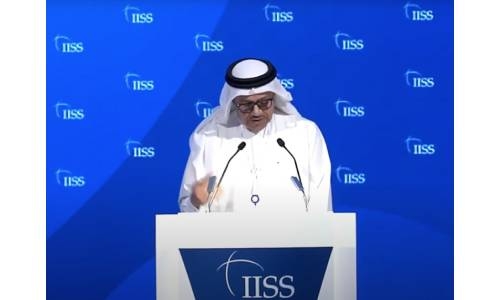Diplomacy key to effective deterrence: Al Zayani
TDT | Manama
The Daily Tribune – www.newsofbahrain.com
Minister of Foreign Affairs, Dr Abdullatif bin Rashid Al Zayani, yesterday called on world nations to be creative in using diplomacy and data analysis in the post COVID era as a tool for deterrence against aggression.
“Doing so will produce a win-win outcome for the Middle East by making it safer and prosperous for its people,” said Minister Al Zayani said as he addressed the third plenary session of the IISS Manama Dialogue on its second day of action.
Deputy Prime Minister and Minister of Foreign Affairs and Expatriates of Jordan, Ayman Safadi and the Deputy Prime Minister and Foreign Minister of Iraq, Dr Fuad Hussein, were present.
Diplomacy, the minister said, has a key role to play in effective deterrence.
“It is a vital tool of both effective and passive deterrence.”
“Diplomacy is essential in ensuring our approach, whether hard or soft, to reach the four ‘c’s of effective deterrence, namely credibility, calibration, coordination, and consistency.”
Explaining, the minister said, “Credibility means using diplomacy to communicate that they will suffer consequences should they take actions “we are seeking to prevent”.
“Calibration is to ensure that diplomacy acts as a tool to analyse the level of consequences and to influence the behaviour we seek to address.”
“Coordination is for building alliances of like-minded states to create stronger deterrence.”
“Consistency means communicating clearly and with one voice over a sustainable period.”
Adopt comprehensive view
The minister also called on world nations to adopt a more comprehensive view on deterrence that represents all its forms.
“It should lead us to see more clearly how we could strap it to the broad definition of modern diplomacy,” said Al Zayani.
Deterrence, the minister told the session, no longer applies alone to the behaviour of states but also non-state actors.
“It includes terrorist organisations, militias, proxy groups and many others.”
The measures of deterrence chosen against a state, the minister said, may not be relevant against non-state actors.
In international relations, the minister said, “deterrence” can be defined as seeking to influence the behaviour of an actor to deter a particular course of action with the prospect of sanctions or other negative consequences.
He added: “Traditionally, we tend to view “deterrence” in a slightly old-fashioned, “Cold War” manner, as a state or group of states seeking to affect the behaviour of another state via the explicit or implied threat of force or sanctions.”
Move beyond military action
In this regard, the minister stressed the need to move beyond seeing the deterrence through the lens of military action or sanctions.
In the post COVID era, the minister said the world should look at deterrence as a broad range of potential outcomes that can be leveraged to influence the behaviours of potential adversaries.
Hard power deterrence, the ministry said, thus should be complemented with electronic, cyber, economic and social deterrence.
“This means making the deterrence forces both external and internal,” the minister said.
Let them see the consequence
“This would let the supporters of adversaries see the consequences of the problematic behaviour both in terms of direct negative results like sanctions and also in terms of missed positive opportunities,” he stressed.
“This would make adversaries find themselves secluded from the networks of peace, prosperity, and cooperation until it modifies its behaviour, as the world move on to a more positive future.”
“This will produce pressure from within to change its ways,” the minister said, adding that such passive deterrence may not be effective for all adversaries.
The minister also exemplified that nations want resilience while people seek hope, safety and positivity in today’s post-COVID 19-era.
“Thanks to advances in data analysis and tools like social media sentiment analysis, we now have a near real-time ability, not only to measure and track the sentiment of our people towards national development policies but also how our adversary, its people and supporters are responding to “soft power” deterrence efforts,” the minister said.
Related Posts

